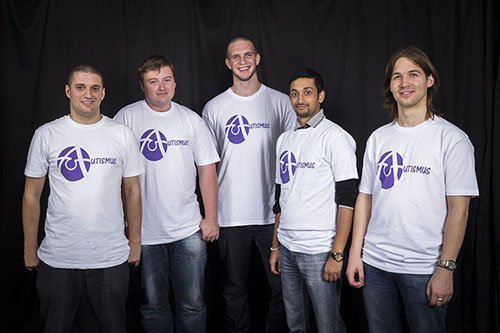
Games deliver new insights into autism
16 September 2013
A free iPad game is giving the medical fraternity something to think about as it delivers fresh observations about children with Autism and Asperger Syndrome.
Nurfland is the first in a series of games being developed by Project Autismus, a not-for-profit group of game developers, parents, Media Design School students and psychologists in New Zealand, India and the United Kingdom.
Nurfland – available free for iPhone, iPad and Android – teaches children aged 4-8 how to distinguish between various human emotions. Data collected as the children play, combined with feedback from parents and teachers, has quickly delivered new insights into their condition.
“It was always thought that autistic children did not understand emotions like sadness or empathy, but our initial results indicate they do understand these emotions they just do not express them in the same way,” said Project Autismus founder Druhin Mukherjee, a senior lecturer at Media Design School.
Ali Cowley’s son Nikau has mild Austism Spectrum Disorders (ASD) and has always engaged with technology and learned through games.
“Ever since Nikau was young he would only talk to us by quoting TV ads and trying to relate a certain quote to what he was thinking. He even learned the alphabet through Thomas The Tank Engine card game. From kindergarden to primary we made visual prompt booklets, as he would only respond to instructions printed out as opposed to me telling him to do something. iPads are the new booklets and I can see Nurfland being beneficial to our ASD kids.”
“Project Autismus will be a great help for children on the autistic spectrum. If ever there was an invention that can help these kids, then video games is it,” said another parent, Roi Macgregor.
The second game in the series is currently in development and will be released in December for children aged 8 years and older. Dost will require players to work together to achieve an outcome, helping to make communication and relationships more natural.
Media Design School is providing funding that will allow Project Autismus to purchase a game engine and release Dost on a wider variety of platforms including Blackberry, Windows Phone and PC. The public can also contribute to Project Autismus via Pledge Me.
“We are excited to see games have a wider impact than entertainment and influence education, business, health and science,” says Media Design School CEO Darryn Melrose. “We are right behind Druhin and this project, in fact Media Design School game programming students Rory McCarthy, Steven Johnson, Ben Carnall, Chris Howlett, Chris Johnson and James Hannam as well as Game Art faculty Aravind Kumar, Ali Cowley and Mike Porter are all contributing their time and expertise to the project – it truly is a team effort.”
Visit: https://www.pledgeme.co.nz/1370 or more information on contributing to the project. All donations will be acknowledged in the game credits.